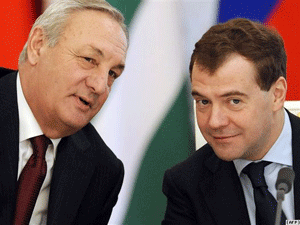 MOSCOW -- Ties between Abkhazia and Russia have blossomed at a frantic rate ever since Moscow recognized the Georgian breakaway republic's independence following the Russia-Georgia war in 2008.
MOSCOW -- Ties between Abkhazia and Russia have blossomed at a frantic rate ever since Moscow recognized the Georgian breakaway republic's independence following the Russia-Georgia war in 2008.
In the latest step, Abkhazia's de facto leader Sergei Bagapsh says his almost universally unrecognized territory would consider joining a customs union with Russia that would further open the Russian market to Abkhaz trade and help boost investment in the territory.
"We are an independent country and this will not change. But we would consider the possibility of joining a customs union with Russia," Bagapsh told RFE/RL's Russian Service in Moscow today.
Bagapsh was in Moscow to oversee the signing of an agreement allowing Russia to build a military base in the breakaway territory. The base will accommodate at least 3,000 Russian troops already stationed in Abkhazia for at least 49 years.
The Abkhaz leader said the Russian base was necessary for the security of the territory, which broke from Georgia's direct control following a bitter war in the early 1990s in which 15,000 people died and 250,000 ethnic Georgians were expelled.
"We don't want a repeat of what happened in 1992-93. We need a [Russian] base in Abkhazia for the same reason NATO needs a base in Kosovo," Bagapsh said.
"Why do European countries want to join NATO? So they can live safely and peacefully. We also want to live peacefully. We have fought too much and we want to live peacefully with our friends."
Russian Domination
Moscow formally recognized the independence of Abkhazia and a second Georgian breakaway region, South Ossetia, from Tbilisi following the August 2008 five-day war between Russia and Georgia over South Ossetia. Since then, however, only Nicaragua, Venezuela, and the Micronesian island republic of Nauru have followed suit.
The Russian base will be located in the port town of Gudauta, north of the capital Sukhumi. Moscow also has plans to house a naval base in the port of Ochamchire, close to the cease-fire line separating Abkhazia from Georgia proper.
Russia's dominance of Abkhazia has become nearly total, with 4,000 to 5,000 Russian land, air, and naval troops believed to be deployed in the region. Moscow has also been granted control over the territory's borders, airport, and railway system.
Most Abkhaz residents carry Russian passports in order to be able to travel abroad and communicate predominantly in the Russian language. And the Russian ruble remains the territory's official currency.
Abkhazia is also dependent on Moscow for state aid, trade, and foreign investment. Bagapsh says the Russian assistance is needed because Western governments, which do not recognize Abkhazia's independence, have refused to help.
"Things developed in a difficult way for us after the war," Bagapsh said. "European structures are not helping us. Russia is helping. That assistance is targeted so it doesn't get swallowed up somewhere. It is aimed at developing infrastructure and our productive capacity."
No Right Of Return
Prior to the 1992-93 war, ethnic Georgians made up the largest group in Abkhazia. Approximately 50,000-60,000 ethnic Georgians displaced by the war have managed to return to Abkhazia.
But Bagapsh says his government will not allow the remaining 200,000 displaced Georgian to return to their former homes, arguing that such a move would be destabilizing.
"It is not possible for the remaining displaced persons to return. If they return, there would be many people among them who took part in the fighting. Their children fought. Their parents fought. This would lead to another conflict," Bagapsh said.
"I have another idea. Europeans, non-Europeans, and everybody else should not be helping [Georgian President Mikheil] Saakashvili to arm himself. Instead they should use that money to help displaced persons to adapt to life in Georgia. That would be the right thing to do."



